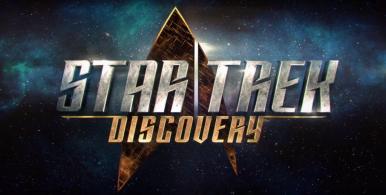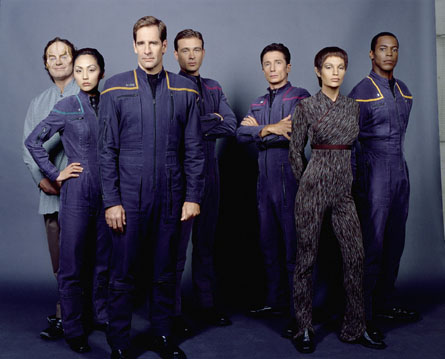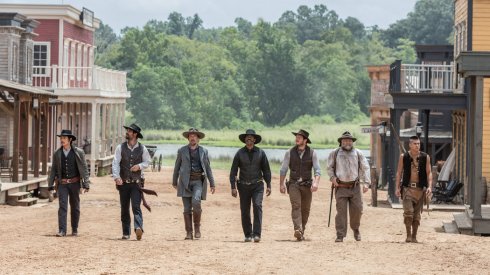
When Enterprise was cancelled in 2005 many thought that was the end of Trek. Even when the films were revived in 2009 it still seemed unlikely Trek would ever return to television. It was therefore a pleasant surprise when a new Trek series was announced. When it was further announced that the showrunner would be Bryan Fuller who, as well as working on DS9 and Voyager, had recently given us the sadly cancelled, yet impeccably magnificent, Hannibal, people got excited. The arrival onto the creative team of Nicholas (The Wrath of Khan) Meyer was just icing on the cake.
What no one knew was when this show would be set. Would it take us back to the 24th Century, would it feature a 31st Century time ship, would it be another prequel, or would it fill in the gap between The Undiscovered Country and Next Gen? People also wondered if it would be set in the Prime timeline, or the alternate one Abrams used to reboot the films.

That ship’s kinda funny looking
Finally some information emerged. The show will be called Discovery, it’ll be set in the Prime universe, and we’ve been given a rough glimpse of the ship. It was at this point that fandom’s excitement wavered. Discovery as a name is fine (a trifle on the nose sure, but hardly a deal breaker) but opinions on the ship itself weren’t positive. It looked old, and a little clunky.
It’s clearly based on 1970s’ design from Bond legend Ken Adam and artist Ralph McQuarrie yet people still argued that it might not be a prequel; it could be an old ship pressed back into service after some future collapse of the Federation, or even one designed to look retro by nostalgic 26th Century designers…
Occam’s razor held true. The most obvious conclusion was that this was going to be a prequel, and lo and behold we learned Discovery’s going to predate TOS by ten years.

The original Number One, before she quit command to go into nursing!
We still don’t know much more. To date no casting announcements have been made. We know the lead character won’t be the Discovery’s captain, but rather its first officer, she doesn’t have a name yet but will be referred to as Number One (a homage to Majel Barret’s character in The Cage), and we’ve been told that the series will be connected with the Original Series episode Balance of Terror, but we know not how.

Fuller has written some great stuff, but let’s never forget he wrote Spirit Folk, where Harry Kim kissed a cow!
Originally the show was due to premiere in January 2017, but that air date was pushed back to May, and just today it’s been announced that Fuller, due to his heavy schedule working on an adaptation of Neil Gaiman’s American Gods and something called Amazing stories, is stepping down as showrunner, though he will stay on as Executive Producer. Only time will tell what impact this will have on the show, but already you can see why fans might worry.
I’m not in a position to comment on the impact of Fuller stepping back, but one thing I think I can wax lyrical about is this: if we’re getting another prequel then Discovery needs to avoid many of the pitfalls Enterprise stumbled blindly into.
Prequels are big business. For franchises that may have reached a conclusion they’re seen as a way to keep the series going by delving into past events. You have a built in audience in a way something completely new doesn’t. The highest profile recent examples were the Star Wars prequels (Interestingly Enterprise was conceived shortly after The Phantom Menace, and both feature a shadowy holographic figure manipulating events behind the scenes—and people say Berman and Braga had run out of ideas…) but we can see this in other franchises as well. Look at the X-Men, or how much effort went into turning The Hobbit into a fully-fledged prequel for the Lord of the Rings.
TV in particular loves prequels. So in the US there’s Caprica and Better Call Saul, whilst in the UK we get Endeavour, featuring young Morse, and Rock and Chips, the Only Fools and Horses prequel. You can see the lure. Who doesn’t want to see a character’s formative years? The trouble is that prequels come with inherent problems.
Most obvious is the fact that we know what’s going to happen, unless you go for the option of creating a new timeline of course. Before Enterprise we’d had four series and nine films. The franchise had a lot of canon. We knew that Balance of Terror was the first time humans saw Romulans, that The Last Outpost was the first time the Federation met the Ferengi, and that Q-Who was the first encounter with the Borg.
Trouble is Enterprise wanted to use these familiar staples. People love the Ferengi, so we’ll be ok if they turn up but no one finds out their species! Same with the Borg, people love the Borg, we just won’t have anyone call them Borg and it’ll be fine.
The trouble is this awkward workaround falls apart if you give it much thought. I can just about buy that the Enterprise D’s database wouldn’t flag “big ears, ultra-capitalistic- sounds familiar!” but the notion that a race of cybernetic vampires wouldn’t ring a whole host of alarm bells is another matter. Now I know there’s been some retrofitting to suggest that the events of Enterprise’s Borg episode were what led Seven of Nine’s parents to go Borg hunting in the first place but that just highlights the problem. To get the Borg into a prequel you have to do a lot of retrofitting.
Enterprise hamstrung itself in other ways; they wanted a ship named Enterprise and a Vulcan first officer, which is fine until someone pointed out that NCC-1701 was the first starship Enterprise and that Spock was the first Vulcan in Starfleet. It’s ok, we’re pre-Federation here, came the response. Yet another clunky workaround.
And don’t get me started on the whole “Meet Captain Kirk’s childhood hero” malarkey. What, this is a show about Abraham Lincoln?
In many ways Enterprise made a rod for its own back by trying too hard to reference existing storylines, then handling them badly; e.g. trying to explain Klingon ridges. Rather than try and chart its own course it too often tried, and failed, to link in with what we knew had happened/would happen.

Theoretically the show should look like this, but it probably won’t.
Another problem is in the look of the show. Now personally I think TOS looks pretty darn iconic (if anything TNG looks more dated) but it’s a look that would be hard to convincingly replicate now. If you’re making a Morse prequel that’s easy, we know what the 1960s looked like, and whatever your views on Lucas’ prequels, it’s easy to explain everything looking shinier because we can rationalise that everything goes to shit after Palpatine’s take-over.
Creating a future that’s supposed to predate TOS (especially by 100 years) is trickier. So NX-01 ended up looking a little too modern, and technology that was supposed to look archaic compared to what was to follow seemed to work the same way. Phase pistols were only supposed to have two settings but within a few episodes were being used to cut and weld like they were 24th Century phasers. And then there were the uniforms. The NASA/Right Stuff vibe wasn’t necessarily a bad idea, but the bland jumpsuits just made the crew look like janitors.

Janitors in space!!!
Of course many of Enterprise’s problems weren’t down to it being a prequel. TV Trek had been going nonstop since 1987 and there was more than a hint of franchise fatigue; on the part of both creators and the consumers. Characters in Enterprise were poorly sketched, it was perhaps the least diverse Trek show, featured wince inducing attempts at being sexy (decontaminant gel anyone?) and then there’s the theme tune…
Setting aside the prequel setting, Discovery already has a few advantages over Enterprise. Trek’s been off TV for over a decade, so when it returns it should seem fresh, and Discovery is being produced by people who haven’t been using all their best Trek ideas up for the last 13 years. It also has the benefit of a 13 episode season, unlike previous Treks that had to try and come up with 24+episodes a year, and the story will be serialised rather than being episodic, so it’ll be more Westworld than Voyager, and the fact that it’ll be streamed via a subscription service could give the show scope to deal with more adult topics, as well as allowing more latitude when it comes to language and violence. It seems highly likely Number One will be played by a non-white actress, and Fuller has already made it clear there’s likely to be an LGBT character so the show should feel the most diverse Trek since DS9.
I’m sure there will be missteps. However much attention to detail there is the technology on show is bound to look more advanced than the Original Series’, and I’ll be amazed if they never play fast and loose with established history, but what’s important are the characters and the writing. If they get those right, and if the show feels like Trek (even if it’s a very different kind of Trek) then myriad sins can, and will, be forgiven. Weaknesses in characterisation, as well as plots that too often felt rehashed from other Treks, just prompted people to look more closely at the detail of Enterprise. If Discovery has engaging characters and interesting stories to tell, then it’ll be a lot easier to let it slide when the ship visits Kwaplaxx-Major ten years too early or Ensign Schmidt’s computer makes Spock’s look like a ZX81…
Whatever we get I know this, I’m really rather excited to be boldly going once more!




